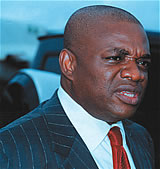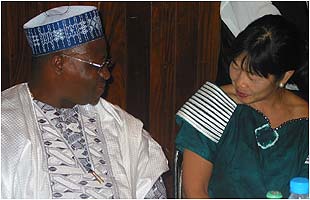 The Nigerian media in the past week has been rife with the unfolding impeachment proceedings in Ekiti and Plateau states, as well as hostage takings in the Niger Delta and the Atiku battle against the EFCC report. One more brewing story which I found pretty interesting was the indictment of Mrs. Eunice Kalu, mother of the Abia state governor, Orji Uzor Kalu, along with eighteen others and the fracas that ensued in an attempt to take her into custody. Kalu was one of the youngest governors elected in the 1999 elections at the age of 39. He seemed to want to project an image of a new breed progressive, who was self assured and legitimate.
The Nigerian media in the past week has been rife with the unfolding impeachment proceedings in Ekiti and Plateau states, as well as hostage takings in the Niger Delta and the Atiku battle against the EFCC report. One more brewing story which I found pretty interesting was the indictment of Mrs. Eunice Kalu, mother of the Abia state governor, Orji Uzor Kalu, along with eighteen others and the fracas that ensued in an attempt to take her into custody. Kalu was one of the youngest governors elected in the 1999 elections at the age of 39. He seemed to want to project an image of a new breed progressive, who was self assured and legitimate.
He is alleged by his paid supporters to have achieved so much at such a young age, having succeeded exceedingly well in business, academia and politics, they boast. Indeed, he is referred to as one of the youngest Nigerian millionaires ever, industrialist, investor, holder of doctorate degrees etc. With such a sleek and coruscating profile, I became more curious. "All that glitters," my third grade teacher often retorted, "is not gold." I took some time to do some research on this fellow, Kalu. My first stop was his website: - http://www.orjikalu.com/biography.php . The immediate impression the discerning mind would have from viewing the website is that this is a fellow hungry for self-aggrandizement. The layout and verbiage reveal someone trying very hard to appear erudite and sophisticated. The unnecessary verbosity and grammatical inappropriateness and errors that leap out from the web pages give away the crass essence of the promoter.
It is alleged that Kalu was a student at the University of Maiduguri in the early 1980s but did not graduate because he could not meet the academic requirements. While a student at Maiduguri, it is rumoured, Kalu was a "dan dauda" (male prostitute) and pimp to a number of influential northern Nigerian alhajis and military men, and that this was his break into business, acting as a front for these influential northerners in the beginning, then later becoming a conduit through whom many were said to have laundered their ill-acquired monies. This preoccupation, it is alleged, had Kalu kicked out of the University of Maiduguri as he was unable to satisfy his academic requirements.
Kalu attempted to use his newly acquired wealth to buy some respectability. He procured for himself a BSc degree from the Abia state University, where no one can recall ever seeing him attending any classes. He also wheedled his way on the board, as chairman, of the badly run and now defunct Cooperative and Commerce Bank Plc. Hungry for limelight, and self promotion, Kalu continued to cavort around with these influential alhajis and military men, seizing all photo opportunities at their private and public functions, to which he was often self-invited. He flashed pictures of himself and these men to whosoever would care, and adorned his residence and office with same to give credence to his supposed close association with them. Having built this aura of "connectectedness" to the powers that be, Kalu wilily extracted favors and contracts from unsuspecting associates with the promise of connecting them to his influential friends. Sometimes, it is alleged, he would outrightly claim to be representing one or more of his powerful military friends as he demanded favors from government officials, who obliged him because they were scared out of their wits and careful not to offend these powers that be, and the pecking order that prevailed during the military dictatorships of the 1980s to 1990s.
With the advent of democracy in 1999, Kalu took advantage of all the chaos and flux that existed, used all sorts of underhanded tactics and thuggery to quell all legitimate opponents and hijacked the governorship of Abia state. Having at his disposal, the state's press machinery, Kalu continued his loud and arrogant self-promotion, bleating his half-baked rhetoric while at the same time helping himself to the state's coffers along with members of his immediate family, including his mother. Under the pretext of fighting crime, Kalu took advantage of the fact that the Nigerian Police found it difficult to meet the demands of crime fighting as a result of years of systematic emasculation by the successive military dictatorships of the 1980s and 1990s. With the Nigerian Police so depleted and demonized, Kalu introduced a vigilante group, "The Bakassi Boys," who were in essence, Kalu's personal army.
The Bakassi Boys, a rowdy band of misanthropic (often drugged) murderers, committed perhaps the worst human rights abuses ever in Nigeria. Under the pretext of routing out criminal elements, this vigilante group was involved in extortion, torture, extra judiciary killings and various other atrocities. They were the accusers, investigators, prosecutors, judge, jury and executioners. All crimes were punishable by death, delivered (literally) by way of a thousand cuts, amputations and decapitation. Sometimes, this pervertion of justice was extended to hapless family members of the criminal so fingered. The Bakassi Boys took no prisoners, hence there was no imprisonment, just gulags of the condemned awaiting execution. All that needed to happen was for one to be accused as a suspected criminal, and as swiftly as the accusation, the "criminal" was condemned and promptly executed, regardless of the veracity of the accusation, or the nature of the crime. It is alleged that the Bakassi Boys were also used by Kalu to settle personal scores, subjugate his opponents and strike fear into the indigenes of the state in the manner of his military dictator friends in the 1980s and 1990s.
To clean up Nigeria's image, as regards human rights abuses, in the international community, the Obasanjo government demanded that the vigilante group be disbanded, there began Kalu's loathing of Obasanjo. This became a full blown "front-page" smear attack when the Bakassi Boys were declared an illegal group and banned by the Federal Government of Nigeria. Kalu's vitriol increased, casting aspersions and making spurious accusations and loudmouth claims, touting his supposed influence and roiling in a characteristic classless, indecorous and self-righteous manner.
There has been an EFCC probe for a while now on how Kalu has been systematically looting the Abia state coffers, but he has been hiding behind the immunity provision in the constitution. It is alleged that members of his immediate family are involved in the systematic fraud and so they have also been under scrutiny. Last week's indictment of his mother and eighteen others is a fall out of this. Rather than respect the law, Kalu is shielding his mother from interrogation by the EFCC. This of course is typical and expected of the opportunistic conniver that is Kalu. It is alleged that plans are underway to smuggle his mother out of the country through Cameroun, while he has filed an injunction against the indictment in a court in Umuahia.
Here is a man who brought in a vigilante group to wreck mayhem on petty criminals and innocents alike, now seeking redress from the court denied the many souls, guilty and innocent alike, who were brutally murdered by the Bakassi Boys without a prayer. Kalu, would you rather the Bakassi Boys be let loose on you and your mother, or face the EFCC indictment? If you, your mother and cohort have your noses clean, the honorable thing to do (not that you are being accused of being honorable) is to let the law take its course.
 In Jos, Plateau state, Joshua Dariye, governor and fugitive of the British law has been under investigation by the Economic and Financial Crimes Commission (EFCC) for a couple of years now. He has been engaged in a tussle to hang on to power (and therefore guaranteed immunity from prosecution) through all sorts of underhanded tactics including bribery and intimidation of all 24 members of the Plateau state legislative assembly. 16 of these legislators have been indicted in their own separate acts of graft (many in complicity with the governor) and are currently incarcerated for these by the EFCC, leaving the Plateau state house with only 8 sitting members.
In Jos, Plateau state, Joshua Dariye, governor and fugitive of the British law has been under investigation by the Economic and Financial Crimes Commission (EFCC) for a couple of years now. He has been engaged in a tussle to hang on to power (and therefore guaranteed immunity from prosecution) through all sorts of underhanded tactics including bribery and intimidation of all 24 members of the Plateau state legislative assembly. 16 of these legislators have been indicted in their own separate acts of graft (many in complicity with the governor) and are currently incarcerated for these by the EFCC, leaving the Plateau state house with only 8 sitting members.


